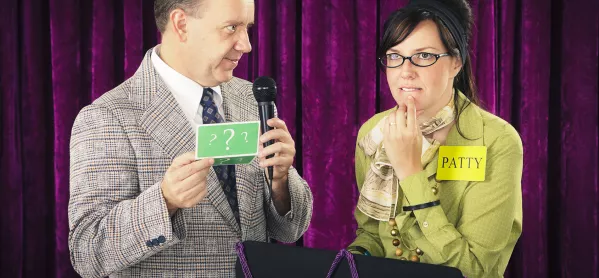
What do teachers and game show hosts have in common?

The year was 2008 and I had just completed my history degree at the University of Glasgow. I had three applications, each of them in different stages of completion: one for Strathclyde Police (as it was then), another for a PhD in industrial history, and the final one for the PGDE (professional graduate diploma in education).
So, what happened? Well, colour blindness ruled out the police application and, as for the PhD, I never actually got that application to a stage where I felt I could send it away.
This meant that I went on to study the PGDE in secondary history during 2008-09 at the University of Strathclyde in Glasgow, making me one of those who was lucky enough to walk the hallowed halls of the David Stow building at the Jordanhill Campus before it was sold off and converted into apartments.
When I think back to my PGDE year, the four capacities of Scotland’s Curriculum for Excellence (CfE) ring loud: successful learners; confident individuals; responsible citizens; and effective contributors. For whatever self-imposed reason, I was adamant about never forgetting them, always being able to rattle them off and apply them in some way to every lesson, activity and resource that I possibly could.
- Editor’s take: We need to clear the debris to see the joy of teaching
- Analysis: Why the fulfilled teacher in TV ads holds key to retention
- Related: How do we know what makes good teaching?
Thinking back, at that time, I most likely needed the framework, a system of reference and measurability that I thought CfE offered - very different from the autonomy I so desperately spent the next decade looking for in a curriculum that has more than a thousand ”experiences and outcomes”, spread across five levels and nine curricular areas.
Teaching, though, is the best job in the world. When teaching is good, it is great. Where else would you get to make such a positive difference in the lives of so many people, their friends, their families, and the communities they live in? But there are countless difficult moments - it would be an insult to suggest otherwise.
In our schools, there are a thousand emotions. They are, after all, buildings filled with human beings, each of them developing individuals growing up in the context of a world that is changing by the minute: fast-moving, hopeful, terrifying, and a bit uncertain at times.
Entering the profession, I was so utterly naive as to the skills and qualities that I needed or would have to very quickly develop. As teachers, we do not just teach our subjects - it is not that simple.
We are frustrated game show hosts in the entertainment that we provide, we are try-our-best counsellors in the life advice we offer, we are parental figures in the nurturing that we give, and we are even novice medics in the countless wet paper towels we distribute. No two days as a teacher are ever the same.
I have taught in three secondary schools, including my NQT (newly qualified teacher) year at Vale of Leven Academy in West Dunbartonshire, and the teacher I was back then is very different from the teacher I am now. Some things I am better at, while other things I remain woefully hopeless at, but, like all teachers, I know my strengths and I know my limitations. I know what I need to do to get the best out of the young people in front of me and, like all of us, I make mistakes - but then sometimes I hit the ball clear out of the park (teachers must cling to the memories of the days when this happens, by the way).
The job is not static, the variables are unreal. Just try teaching a class of pupils when a wasp innocently flies into the classroom; an escaped pitbull enters through a fire exit; a pupil is sick after receiving an immunisation, resulting in a subsequent tsunami of five vomiting pupils; or you fall off your chair in the midst of delivering a lesson - yes, all of these things have happened to me.
But now, as I depart “frontline” secondary education to become a teaching fellow in history education at the University of Edinburgh’s Moray House, I look back at 13 years in the classroom that have been painfully brilliant.
Paul Hamilton was - until recently - a teacher of history and legal studies at Clydebank High in West Dunbartonshire. Now he is a teaching fellow in history education at the University of Edinburgh. He tweets @_PaulHamilton
You need a Tes subscription to read this article
Subscribe now to read this article and get other subscriber-only content:
- Unlimited access to all Tes magazine content
- Exclusive subscriber-only stories
- Award-winning email newsletters
- Unlimited access to all Tes magazine content
- Exclusive subscriber-only stories
- Award-winning email newsletters
You need a subscription to read this article
Subscribe now to read this article and get other subscriber-only content, including:
- Unlimited access to all Tes magazine content
- Exclusive subscriber-only stories
- Award-winning email newsletters
- Unlimited access to all Tes magazine content
- Exclusive subscriber-only stories
- Award-winning email newsletters
topics in this article



